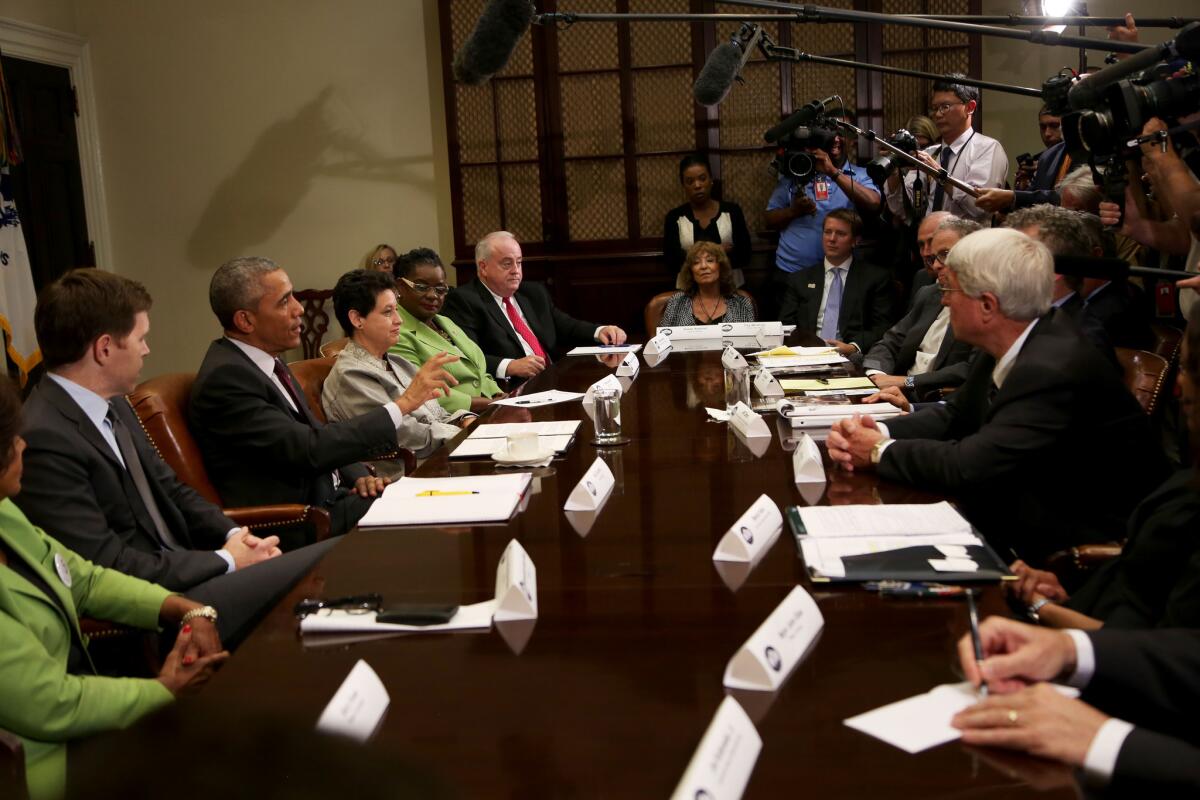Op-Ed: No Export-Import Bank? No problem.

President Obama meets with small business owners to discuss the importance of the reauthorization of the Export-Import Bank in the Roosevelt Room of the White House on July 21.
- Share via
July was supposed to be a particularly bad month for the U.S. economy. On June 30, the U.S. Export-Import Bank’s charter officially expired. For the previous 81 years, this little-known New Deal relic handed out hundreds of billions of dollars in taxpayer-backed financing to benefit a select few well-connected companies, which used the taxpayers’ generosity to sell their products overseas. Many of those businesses spent the last few months predicting that the bank’s expiration would be devastating for American jobs and the country’s global economic competitiveness.
After three weeks of nonstop lobbying and outside pressure, including from President Obama, the Senate voted Sunday to reauthorize the bank, and the House of Representatives is debating whether to follow suit this week. It should not.
All of the hysterical predictions are wrong. The economy looks no different now than it did on June 30. Nor should anyone expect the economy to suffer from the bank’s expiration in the coming weeks, months and years.
By its very nature, the Export-Import Bank is corporate welfare, and its beneficiaries have no interest in seeing the taxpayer money dry up. Their claims about the bank’s importance are a reflection of this fact; what they want is for the American public to bear the risk for private companies’ profit.
Even though the bank’s charter expired on June 30, the bank itself will survive for some time. According to the Congressional Research Service, it will continue “administering its assets and collecting any obligations it holds,” which could take years. Its beneficiaries have plenty of time to find alternative financing from the private market.
Despite claims that the Export-Import Bank is a friend to small business, big firms typically benefit from around 75% to 80% of the bank’s taxpayer money on an annual basis. A mere 10 companies received 64% of the bank’s financing in 2013, and roughly 30% went to just one company: Boeing. Yet Boeing has already indicated that it will be able to find alternative financing for its planes.
A 2014 analysis by Standard & Poor’s found that the bank’s closure would have little or no effect on its largest beneficiaries, including General Electric, Caterpillar and others. In short, the private sector is ready and willing to replace it.
More broadly, the bank’s expiration could actually help the economy. The less than 2% of American exporters that benefit from the bank may bemoan their loss of subsidies, but the other 98%— more than 300,000 companies — are now able to compete on a level playing field.
The Mercatus Center’s Veronique de Rugy has shown how the Export-Import Bank’s support for one company can have unintended, negative consequences for others because the recipient gets a competitive edge over its rivals. Similarly, when the bank uses taxpayer funding to help a foreign company buy an American-made product, that same company can gain an advantage over American firms.
This is particularly true for foreign airlines that buy Boeing’s planes — Boeing benefits, but domestic airlines suffer. The Air Line Pilots Assn. estimates that the bank’s support for just two foreign airlines — Emirates and Air India — has eliminated roughly 7,500 airline jobs here at home.
These unintended consequences directly refute one of the most-repeated claims about the bank’s expiration — that jobs will be lost. Expiration could actually spur job creation at businesses that are no longer at a taxpayer-financed disadvantage.
Indeed, although the bank’s champions say that it supports some 164,000 jobs that are now at risk, other federal agencies point out this should be taken with a grain of salt, or even the whole shaker. The Government Accountability Office — the federal government’s nonpartisan internal watchdog — has documented how the bank’s clumsy attempts to boost exports “largely shift production among sectors within the economy rather than raise the overall level of employment.” The GAO also found that the bank can’t distinguish “between jobs that were newly created and those that were maintained.” But perhaps its most important finding is that the bank “cannot answer the question of what would have happened without Ex-Im financing.”
These findings point to a simple conclusion: Politicians and bureaucrats shouldn’t be in the business of picking the economy’s winners; they will inevitably end up picking losers too. Better to let the economy create jobs and exports on its own, without tipping the scales in any one company’s or industry’s favor.
It remains to be seen whether Congress is willing to let that happen. The House may pass a reauthorization before the end of the week. If only lawmakers would recognize that, when the bank expired on June 30, taxpayers were let off the hook and American exporters were given a level playing field for the first time in 81 years.
That’s something Congress should celebrate, not reverse.
Andy Koenig and Marc Short are the senior policy advisor and president, respectively, at Freedom Partners Chamber of Commerce.
Follow the Opinion section on Twitter @latimesopinion and Facebook
More to Read
A cure for the common opinion
Get thought-provoking perspectives with our weekly newsletter.
You may occasionally receive promotional content from the Los Angeles Times.









